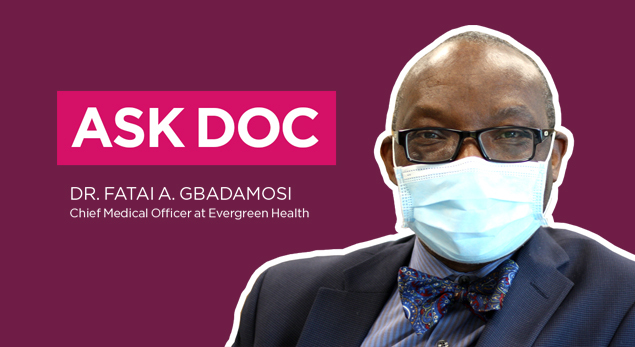Now accepting new primary care patients in Buffalo and Jamestown. Call 716.847.2441 (option 5) or fill out our new patient request form
Addressing Racial Disparities in Healthcare
February 26, 2021

At Evergreen, we envision a future where everyone has access to affordable healthcare in an inclusive, compassionate, respectful and judgment-free space. Our core values to welcome everyone, celebrate diversity and respect everyone’s life experiences determine how we operate and succeed. Last summer, we reflected on racial inequity and the social determinant of health present in the healthcare system and ways we can use healthcare as an opportunity for equitable change. As 2021 begins, we decided to touch base with Dr. Fatai A. Gbadamosi, chief medical officer at Evergreen Health and see what Evergreen has integrated for racial equity.
Dr. Gbadamosi, better known around Evergreen as Doc or Dr. G, begins by explaining the three-year racial equity action plan Evergreen has committed to so that the organization can move closer to the goal of being a more equitable workplace and providing care through a health equity lens. Although Evergreen has had an equity department long before many businesses were being held accountable, Doc believes this three-year plan will get Evergreen closer to an unbiased healthcare approach.
“Population health is something we take seriously to make sure we have a better analysis to address quality,” says Doc. Foundational data is meant to hold the organization accountable, internally and externally and will help create a baseline from which to grow. Increased education and training and identifying areas of opportunity within the organization are also key goals.
“We need to have an understanding of social determinant of health being addressed to help healthcare through equity,” says Doc. “Because if someone is homeless, poverty stricken or cannot afford care, we need to make all efforts to make sure that is addressed so we can get them up to par with the rest of the population.”
Population health data gives Evergreen better analysis to address quality. Additionally, healthcare must be personalized to the patient’s specific situation and needs. Doc says, “What works for Patient A doesn’t necessarily work for Patient B. Unless you take a closer look at an individual, they may have the same problem but the outcome may not be the same because of their unique situation.”
Doc recalls an instance where a Black patient was not treated in an equitable manner when referred to another organization, “A gentleman needed surgical intervention to see a specialist. He had HIV, which is a stigma in itself, plus the color of his skin. I always encourage my patients that when they go to a specialist, ‘I want you to tell them about your medical history so they can best address your care.’ He did. Well, unfortunately, as soon as he mentioned his [HIV] diagnosis and of course the color of his skin, the plan seemed to change after that. He was told, ‘You don’t need surgery.’ Well, he came back and wasn’t so happy. I wasn’t too happy either, of course. I reached out to the group and talked to them. It was an uncomfortable discussion. But they said, ‘Well let him come back and we’ll take care of him.’ And they did, but the problem is, do we have to do that for everybody?”
The goal of health equity is that people are all treated based on their individual needs. “They are human beings who need to be taken care of correctly, and that’s what we do,” says Dr. G. “Medicine is meant to take care of people regardless of their background.”
“I am a very optimistic person,” continues Doc. “Trust is not something you can gain overnight, so it has to be built over time. We have opportunities to do it now. When people see a proactive role being played at all levels, whether it is community, state or federal, that will improve trust over time.” Dr. Gbadamosi and the team at Evergreen are committed to enacting positive change so that trust can be restored in healthcare and everyone will be treated fairly and with respect.
Evergreen Health’s mission is to foster healthy communities by providing medical, supportive and behavioral health services to individuals and families in Western New York – especially those who are living with chronic illness or who are underserved by the healthcare system. Explore our website for more information about our programs and services or call us at 716.847.2441.